#and if you wanted to argue that the Narrative of the show is what makes a difference then i would also disagree with you
Explore tagged Tumblr posts
Text
ppl tend to act like you're exaggerating for disliking spop, since they love arguing "but it's a show about (romantic) love and redemption! you're just mad to see lesbians winning <3"
but the thing is, c//a ISN'T the only issue with spop.
it's all the "friendships" where the characters don't like each other OR WORSE, the "cool and popular" characters bully the ones that are "weird", "annoying" or "different" overall (read: entrapta and kyle).
most romantic relationships weren't written well or were downright forced, such as g/limbow, s/corfuma, and especially r/epkylonnie (rooted in bullying of all things!). even the healthier ships like s/pinnetossa or bow's dads were sidelined. they only gave spinnerella and netossa screentime in s5 bc they wanted to parallel them with adora and catra.
the diversity isn't even that good, honestly. the characters of color receive little to no love from the show and from the fandom. BOW, my god, he's not only the black best friend character, he also has no meaningful character arc. he's just there for the plot, he changes his personality and morals when the plot wants him to (especially to make catra look better). although glimmer was probably one of, if not THE best character in the show (saying this with s4 in mind), sadly s5 only shoved her with bow romantically since they were reduced to wingmen and not adora's actual best friends. and if i talk about the other characters of color, such as micah and castaspella, we'll be here all day, and i've written about it in other posts.
other than that, disabled characters (hordak and shadow weaver) are the villains, the canonical trans/non-binary character was deceiving the good guys by pretending to be a little girl, the themes of war were never taken srsly, only when it was convenient, and in the end the creator dared to sum everything up by "it's catra's and adora's show!!!".
yes, there were elements in spop that i loved, like the original best friends squad and entrapdak, and i liked the narrative of abuse when it DIDN'T spit on adora's face. i loved seeing her standing up to shadow weaver and catra for what she believed was right. like it was so inspiring! i would've loved this as a kid!
this show had so much potential but they teach the worst messages to kids, especially "they hit you because they secretly like you". that fucking sucks. i don't hate lgbtqiapn+ rep - the rep here is BAD. and again, the grievances ppl have with spop are BEYOND the romance!!!
30 notes
·
View notes
Text
Hazbin Hotel Angelic Wings Theory
Something I thought of while falling asleep last night, is that after Vaggie regains her wings, they become retractable.
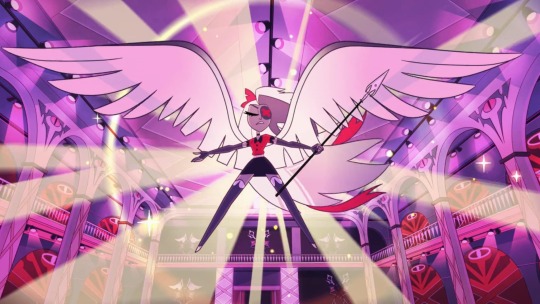
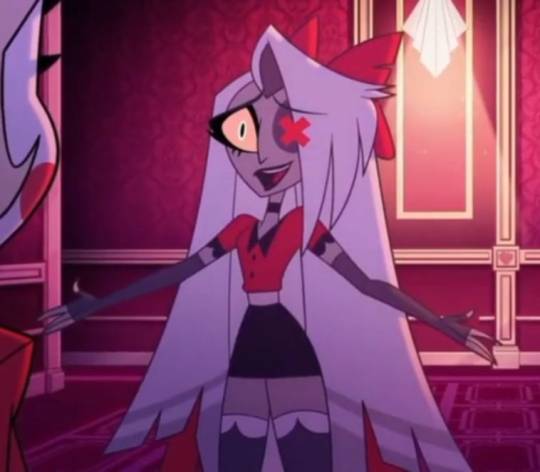
Vaggie regains her wings in Hello Rosie, but as we can see in the next episode they're seemingly gone
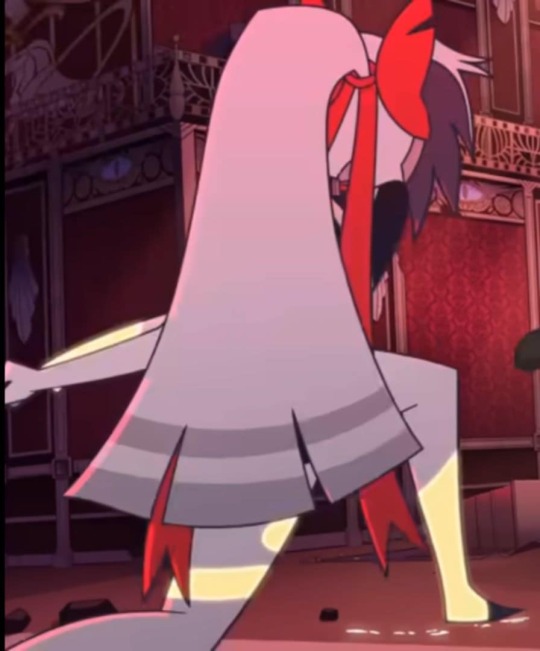
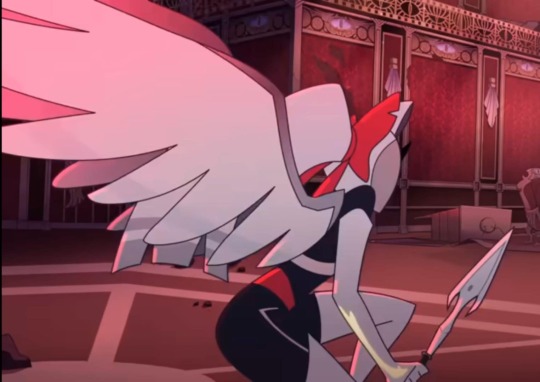
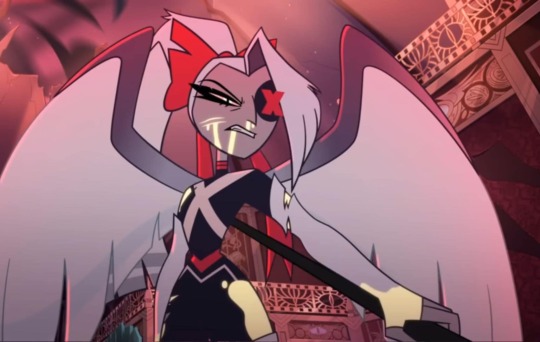
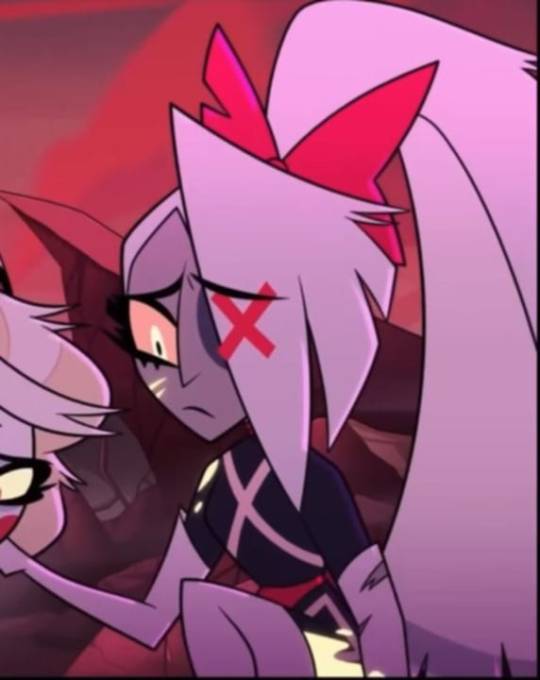
But later in The Show Must Go On, it's shown she can just pull them out at will and then retract them when she wants later.
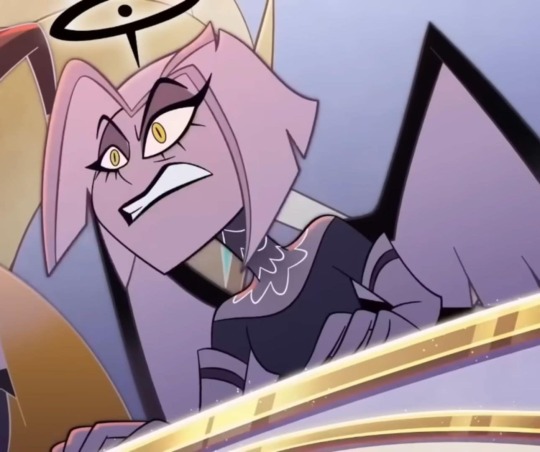
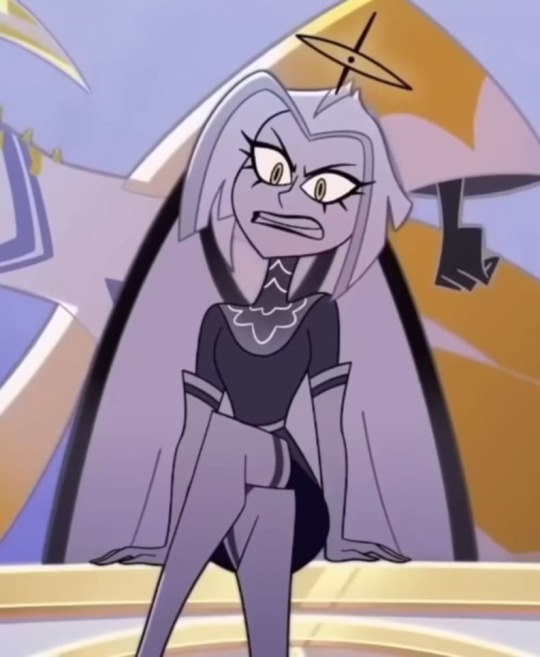
Now comparing her to another Angel of her kind (exorcists) Lute ALWAYS has her wings out and it appears she CANNOT retract them. (This also applies to Adam but I don't think he counts as a true exorcist angel)
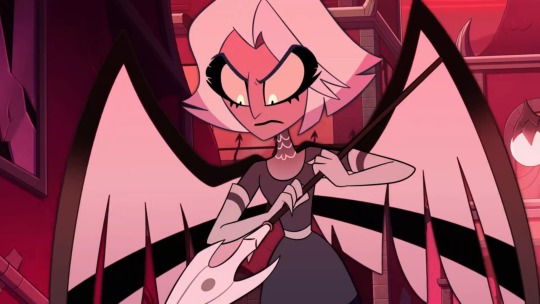
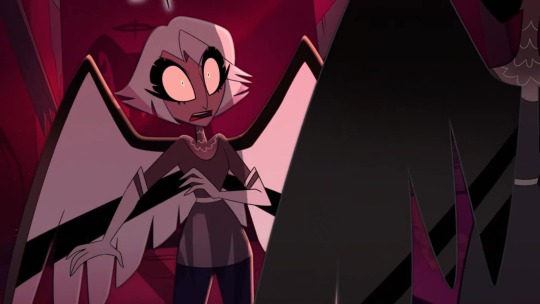
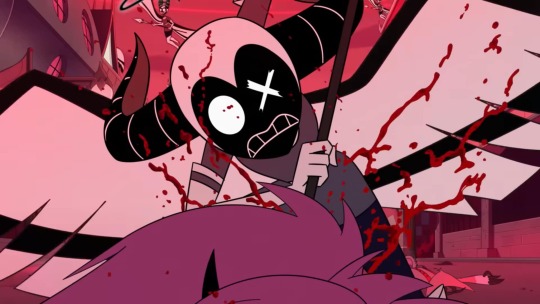

This may also apply to Vaggie herself before she was brutalized and attacked by Lute. As she has her old set of wings at all times.
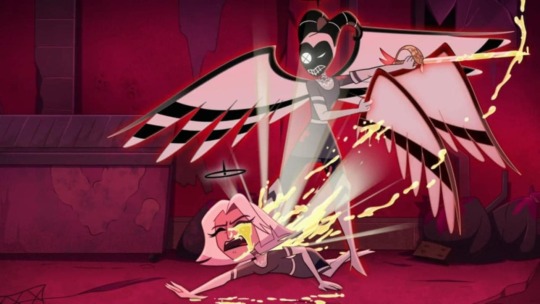
(Yes, TORN off, not CUT off. Lute didn't use angelic weapons to cut off Vaggie's wings, she TORE them off with her bare hands. That's why Vaggie was able to grow them back)
So perhaps having your wings physically torn off in some way, when you grow them back it has the side effect of making them retractable. I was thinking that maybe the animators just don't want to draw the wings at all times but clearly they do for other angels and other winged characters so this seems purposeful.
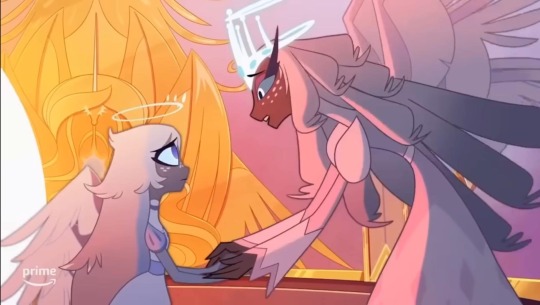
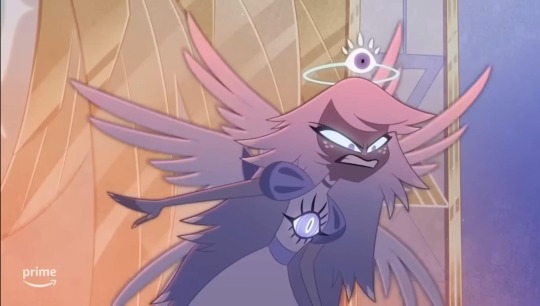
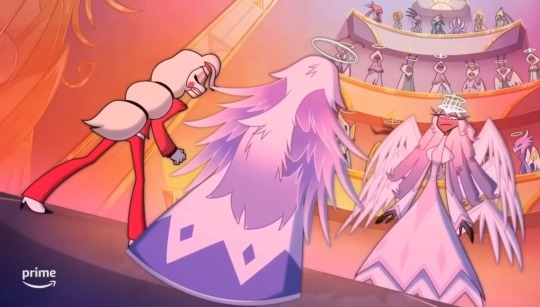
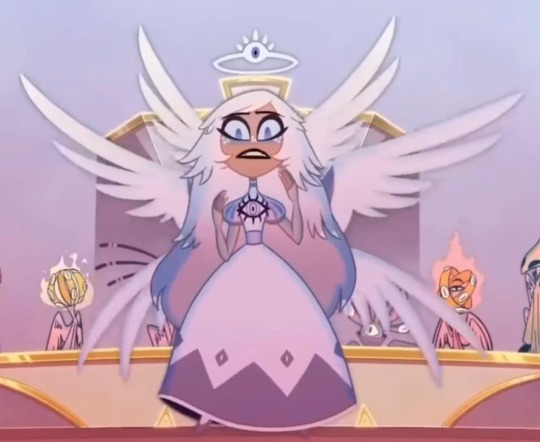
This also seems to apply to the seraphim angels we see, Sera and Emily. They ALWAYS have their wings out and it doesn't seem they can retract them at will.
Now, who else is a Seraphim who CAN retract their wings?
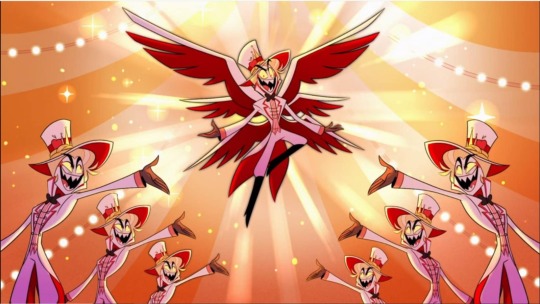
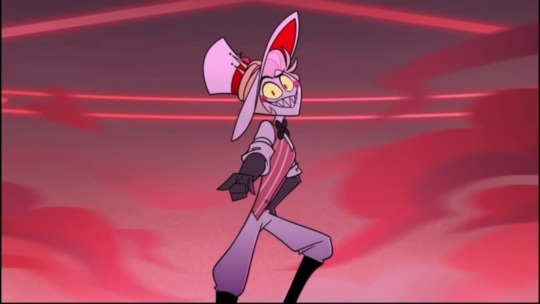
Yes, it's Lucifer.
In fact, it seems Lucifer highly prefers to keep his wings retracted. Seemingly only using them to fly, fight, or show off. They also appear to come out automatically similar to his horns when he goes full-demon.
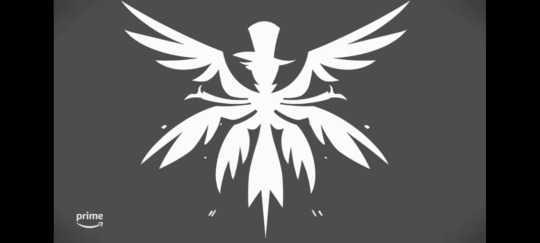
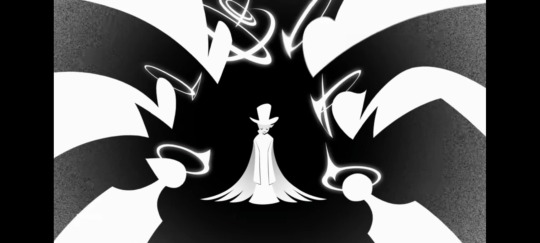
Now I actually did go back to the opening storybook sequence, and Lucifer has his wings out the ENTIRE time rather than just before which does make this a bit confusing.
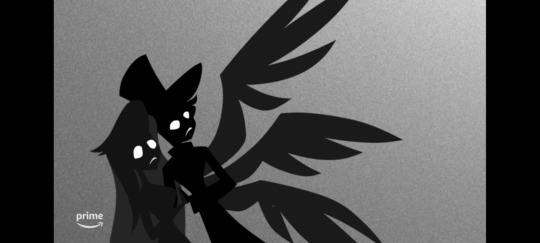
But I do find it really odd he only has half his wings here, just before being thrown into hell, despite it not being a side profile. As an artist I really see no reason for that choice, it wouldn't really affect the silhouettes too much because they show overlap in earlier scenes. It just seems super odd here. But at the same time, there's no way to know the true intention of why they drew it the way they did. Maybe it was to make things appear clearer, it could be foreshadowing he lost half his wings? Who knows. I don't have an answer for this part.
But It's also important to note this opening scene was narrated to us as if it were a storybook being read to a child. Narratively, It's a simple narration/exposition of a previous event in the story. A lot of shows do this and leave out the details in order to actually show us what happened on screen in a flashback down the line. And to make that actual flashback more satisfying and NOT feel like a waste of time, they most definitely had to leave stuff out of this initial exposition. (Plus you still want mysteries to keep viewers engaged) Think of the Roo, Root of all Evil Theory, or how they don't talk much about Eve at all. This could be stuff they intentionally left out in case they do have a flashback of this moment later in the series.
So it's entirely possible that they purposely left out Lucifer getting his wings torn off to make it a surprise for when they do actually show us the fall of humanity, and in turn, Lucifer's fall.
Of course, you could argue that Vaggie and Lucifer CHOOSE to retract their wings while the other angels don't, but the fact that no angel we know of besides them does it, and they're both fallen angels, one of which we know FOR SURE had their wings torn off, it raises enough eyebrows for me.
Basically, I think it's very possible that through the evidence of Vaggie's wings being retractable after growing them back, and every other angel we know of never retracts their wings and has never had their wings torn off, it can be assumed that Lucifer might have had his wings torn off as punishment when he was sent down to hell.
#hazbin hotel#hazbin hotel theory#hazbin hotel lucifer#lucifer morningstar#lucifer magne#hazbin lucifer#lucifer hazbin hotel#hazbin hotel vaggie#vaggie hazbin hotel#hazbin vaggie#hazbin lute#hazbin hotel lute#lute hazbin#lute hazbin hotel
21 notes
·
View notes
Text
One of the biggest arguments I’ve seen used by the Ob*d*l*s against Anidala, is that scene in the ROTS novel where Padmé says she could trust OW with the secret of the rebellion and was hesitant to tell Anakin and I just wanna say:
Padmé wasn't an idiot. She was an extremely intelligent and competent woman, perfectly able to understand that loving Anakin and thinking that he could be trusted with a certain politic-related matter were two very different things and reducing her choice regarding who to trust with an important political matter only on the basis of her feelings of romantic love diminishes her professionalism, and this is why I say y'all could never understand her.
Padmé didn’t have to "love" OW or even like him at all to know he was the perfect Jedi to ask for help in a secret political matter.
That's the point being made in the novel, she’s hit with the realization that Anakin in this particular moment could not be told this piece of info because of his relationship with Palpatine, and Padmé specifically mentions in the Junior ROTS novel that she didn't want to make Anakin “keep a secret” if he didn’t agree with their stance because it’d be “unfair.” So this also played a part in why Padmé didn’t think it best to inform Anakin about the Rebellion. It honestly had little to do with her actually lacking trust in him, and more to do with the circumstances she was in not allowing her to be open with her husband and her not wanting to make him choose between his wife and his “father figure.”
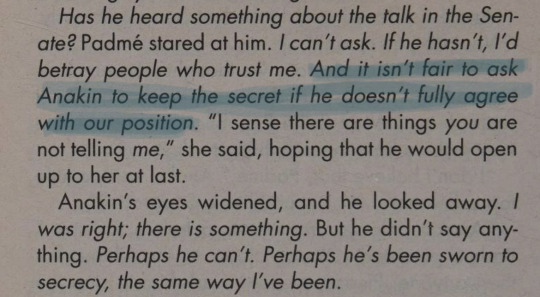
However, Padmé knows OW’s political ideas aren't tied to ONE particular person but to a philosophy, one which is closer to her own, at that point. None of this was ever meant to be hinted as “romantic” or even remotely insinuated as romantic. It’s strictly professional and even the tone of the scene makes that so abundantly clear.
All I’m saying is that, some of these proshippers are doing the most out here to try and prove their ship, like my loves? You forgot a very important thing called ✨ context ✨ and regardless of her rational thinking, Padmé still went out of her way to try and talk out all of this Rebellion secrecy stuff with Anakin when she confronted him in the scene where she asks if he ever thought they were “fighting on the wrong side.” Padmé didn’t trust OW in the same way she trusted Anakin (with her entire self and being) she had the level of trust and love for Anakin that was only meant for him.

Mixing up her unwavering faith in Anakin as her husband with her trust in OW’s devotion to duty as her comrade/ally is purposely deluding yourself, because the two aren’t the same and therefore can’t be compared. An example of this is: Padmé constantly putting more value to Anakin’s words over OW’s in the end of ROTS when he came to tell her of Anakin’s “crimes”. She completely disregarded what OW had claimed about her husband and instead made her way to where Anakin was herself, to ask him directly. Despite what the truth was, this is proof of her trusting Anakin unconditionally, and I didn’t even think I had to spell that out because it’s as clear as day.
In conclusion, Padmé didn’t trust OW more than Anakin, she just knew the circumstances she was in didn’t exactly make it easy for her to openly talk with her husband about these matters and that’s part of what played into the issues they had in ROTS, it’s exactly what Sidious wanted. This scene in the novel doesn’t exist to imply some hidden romantic undertone that George was intending all along. No, far from that. George was always an “open, , clear and easy to understand” type of storyteller, so if the former was the case, this scene wouldn’t be any different if there was some hidden message or subtext the reader should be made aware of, George would make it obvious. Fact of the matter is, the one and only reason for this scene in the novel to exist is only to show to us as the “reader” that the narrative is tearing apart the Star-Crossed-lovers (Anakin and Padmé.) and visibly putting the two of them on different sides in the story because the consequences of this narrative choice is what will foreshadow and play into the inevitable and great fall of the couple and character in the future. Even the novel makes a very purposeful and clear distinction between “love and trust” in this chapter where all this occurs. Padmé loves Anakin, but knew she had to trust OW with the situation at hand. And if you want to talk “narratively” Padmé needed a reason to keep the Rebellion a secret from Anakin, thus leading to Palpatine to sense “betrayal” in Padmé later on, and using that to his advantage to manipulate Anakin even more into getting him to “suspect” her. It’s all spelt out for us and it’s not hard to miss. All it takes is a little media literacy and understanding context.
(Mind you, hypothetically, if this scene existed for literally any other reason, it would’ve been brought up again, but it wasn’t. It’s only mentioned once and exists for only one moment which was meant to serve a certain narrative and then it was done. There’s not much to make of it since the context of the scene is so clear.)
#star wars#anidala#anakin skywalker#padmé amidala#sw novels#revenge of the sith novelization#revenge of the sith junior novelization#avoiding tagging and using full character names because I don’t wanna attract those weirdos on my post#haters dni#anti ob****d*la#i’ve seen shippers claim that ow and padme would make a better couple simply because they both value duty and share some of the same ideals#even though padmé’s strong sense of duty doesn’t define her personal identity#she’s always wanted to leave behind her responsibilities to live a simple happy life with her husband#she stays out duty and care for peace and justice in the galaxy#which is actually a trait she shared with anakin not ow#anakin is loyal and dutiful because he cares about helping people and that’s padmé’s aim too#ow stays to help people because of his devotion to the jedi#that’s not the same#saying she’d be more compatible with ow is like the punchline of a bad joke#in every way padmé shares more in common with anakin when it comes to the core of her personality#and relationships aren’t built off sharing ideals mind you#it’s about connecting and sharing core values which is what anakin and padmé always had#there’s a reasons why padmé and ow argued a lot in wild space#padmé says the one thing her and ow can agree on is loving anakin otherwise their mindsets clash way too much#compatible? never in a million years.#padmé herself disagrees#and apart from the fact that canonically padmé never shows romantic interest in him#nor does the narrative include ow as one of padmé’s love interests…#holy god my tags deserve their own posts
103 notes
·
View notes
Text
i’ve never been as angry on behalf of a character as i am for sam winchester
#currently thinking about season four and five. absolutely fuckibg mental#the world literally reshapes itself around him to prove him wrong#its all framed as God. Sam was so stupid and selfish and reckless for drinking demon blood. He just liked the power of it and he chose a#DEMON over DEAN.#but. that’s not the story they tell in s4.#like even aside from every single other complexity. Sam is literally right. he has ZERO WAY of knowing that killing lilith is the final seal#AND DEAN DOESNT KNOW TJAT EITHER. like sam is literally right he can kill lilith and he does kill lilith. dean wants lilith dead just as#much. sam’s cardinal sin is disobeying dean and then the world flips around on him and plot twist sam and dean were both wrong all along and#killing lilith is what will bring back lucifer :)#but. it’s not framed like that either. it’s framed like SAM BROUGHT BACK LUCIFER BY KILLING LILITH WHILE HIGH ON DEMON BLOOD#dean you wanted to kill lilith too?????????#but. doesn’t matter dean despite being mostly motivated by jealous anger is retroactively proven to be Right#and sam is retroactively proven to be Wrong. he is bad#i just. jesus. sam’s not evil ever. he’s hardly even that fucking morally grey#and he still thinks there’s something wrong with him that he’s a freak that he’s inherently evil and needs to be purified#why?? cause of something fucked up that happened to him when he was a baby#and because he’s disobeyed his father and his brother and been angry at awful things that have happened to him#makes me feel fucking insane actually#no wonder narrative frames sam as evil no wonder he’s inherently marked as Bad by the forces in supernatural like even on a meta level#in supernatural gods just another shitty father. embodiment of the familial patriarch. and from sam’s very first moment on the show he’s in#opposition to that he’s ran away from john and he argues with dean. therefore he is evil#i don’t think my words r really making sense right now but. fucking hell#and sam is so swamped in guilt all of season five and he just fucking accepts that everything bad is his fault#and he gets tortured in the cage to save the fucking world and it’s STILL not enough. not to appease his own guilt and not to appease deans#anger at him. dean is still throwing his perceived violations back at him in like season nine!!#and whenever he tries to get out it’s treated as yet another Sin. narrative acts like sam thinking dean was dead and having a life outside#of hunting is The Worst Thing He Ever Did#worst sin sam ever commits in the eyes of the show is disobedience. Absolutely awful actually#spn#sam winchester
145 notes
·
View notes
Text
y’all out here saying Izzy’s death made no narrative sense because it’s a comedy show clearly haven’t seen the Shakespeare post…I’m sorry I really am but death immunity only applies to the romantic leads the genre has not changed babes
(I don’t mean this to be patronizing, but genuinely: critically analyzing and engaging with art is a skill, and an important one. it’s a tool that will help you in the real world, for real current events. use this as practice not to take everything at face value. sad art does not equal bad art!)
#it was not lazy writing this was always the narrative 👏#instead of thinking the show is dumb for making you sad PLEASE think about why the show might have wanted you to feel that way#(and fwiw I didn’t see these takes about ‘oh it’s a comedy why would they do this!’ when ed was suicidal…)#this is like being in 9th grade lit with all the kids arguing that Romeo and Juliet were just stupid teenagers#did I see this coming? no!! but it makes sense if you’re consuming this story as a real story instead of screen time with blorbo hour#(which is a fine way to consume it if you want!! but you can’t come at the show for being what it always was…)#s/o to the Izzy enjoyers who get the difference bw fanon and canon you’re the real ones#ofmd#ofmd season 2#ofmd spoilers#ofmd s2 spoilers#our flag means death#ofmd meta
259 notes
·
View notes
Text
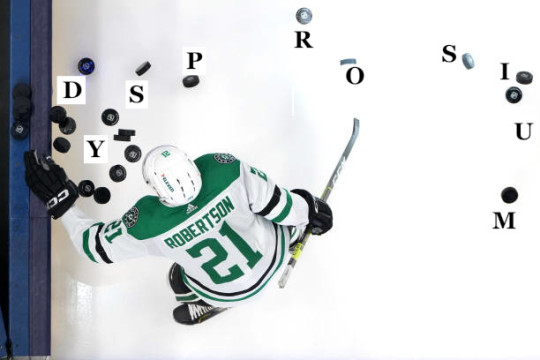
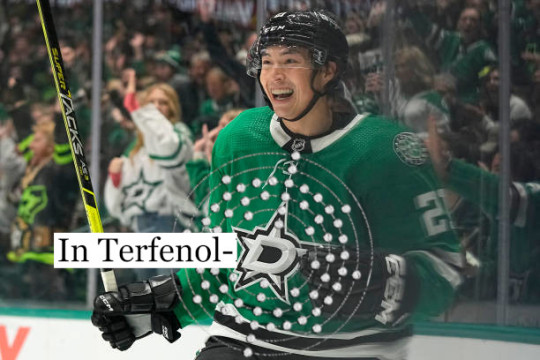

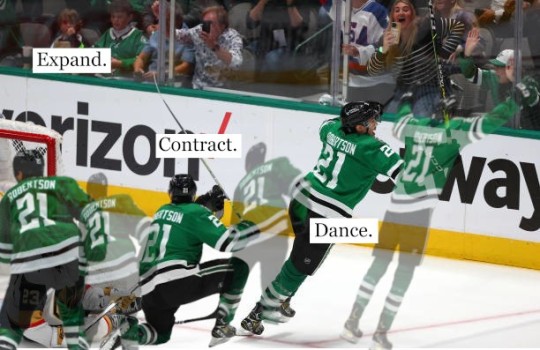
Dysprosium, Mary Soon Lee
dysprosium, AN 66, is a silvery-white rare earth metal. its name is derived from the greek dysprositos, meaning “hard to get at”, owing to the difficulty in separating and isolating this rare earth element. dysprosium is used to measure neutron flux, to fuel reactors, and to activate phosphors. terfenol-d is a magnetorestrictive alloy, meaning that it changes shape when a magnetic field is applied, and is used to manufacture underwater acoustic systems.
jason “robo” robertson, dallas stars #21 for @simmyfrobby’s nhl periodic table poems <3
#i had a couple different ideas for poems that were taken by the time i could go deranged for a couple hours to make this but as I looked#i was like WAIT NONE OF YOU KNOW HOW MUCH I LOVE JASON ROBERTSON YOU HAVEN’T SEEN MY TEXAS CAM and had to do it. also was STRUCK with the#sudden immaculate vision of the Dallas D as part of terfenol-D and could not get it out & robo is the most dance! person i know on the team#liv in the replies#dallas stars#jason robertson#nhl periodic table poems#guys i am plagued with visions and no execution skills!! every day i come here and learn one new skill on GIMP the way god intended!!!#today it was emboss. also cannot claim any credit for the pulse to the magnetic beat photo which is so cool that was one where i had a#couple and was like maybe i can do like crayon shockwaves like the art process video kasper showed? and then found that picture and was#like thank you lord stanley for knowing my limitations. thank you for your understanding in this moment it was a trial enough to make#expand contract dance and one would THINK i would have fucking learned from the claude animorphs tragedy!! i did not. but i did use the#shear tool and 3D rotate so at least if we’re animorphing it’s SLIGHTLY better. anyway me frantically doing this like WAIT WAIT WAIT WAIT#WAIT FOR ME YOU GUYS ARE SO FAST i keep seeing all of these and just spinning around in circles until i get dizzy & fall down I’m so happy#the drive folder for this is just called joy!!!!! because joy this is such a cool idea but now because it brings me so much joy#i just saw the Travis dermott one and burst into tears super normal AND someone did exactly what i wanted with hydrogen which was the water#the ice!!!!! it’s so perfect!!! and cody ofc did silver lord stanley. like does it ever make you cry how beautiful & creative everyone is?#anyway if you see me post and delete this and then update it or change it no you didn’t it’s fine. but i wanted to be included#if i could make the dysprosium letters not have a white background i would I simply could not fuck with it at 1AM. we are hitting send#it may not look like it but i queue#pretend i spoke at length about the reasons why i picked all the pictures & the element just know that it’s there inside my brain u can ask#GUYS I TAKE IT ALL BACK I SAW NEONFRETRA’S ISOTOPES AND I COULD MAKE THE EDITS EVEN THOUGH THEY’RE THERE!! ISOTOPES!!!! YOU GUYS!!!!!!#get ready for the edits then. dylan magnesium my beloved child of stars who can never return… like i wish i could say anyone else but it’s#i KNOW number nineteens bismuth don’t make me Google how many years nolan played hockey but also there’s ej for stable so.. also half-life#actinium claude giroux my beloved… when i saw there already was a claude i thought maybe Brady too for that#I don’t know how but flerovium doubled magic is percolating in my brain as was promethium bad boy because I was like hmmm. tyler. but#couldn’t commit and THEN SOMEONE DID BAD BAD LEROY BROWN TYLER BERTUZZI TO PROMETHIUM AND BESTIE I AM KISSING YOU ON THE MOUTH!!! with cons#anyway shane wright germanium with juraj slafkovský but showing him very obviously not missing it. if jack eichel was not an asshole#the narratives WOULD be narrativing. you could argue for a sidovi here with the calder cup and potentially a best friend stealing narrative#(the most recent is cam yorke’s acquisition of jamie d from trevor zegras which would then require a yorkie one for silicon the other side)
13 notes
·
View notes
Text
realizing that it sounds kind of mean for me to be referring to this fic as the “cringe loser” fic if you don’t have the extensive lexicon i’ve created in my head for the lengthy opinion essay i haven’t written about how most people don’t actually want “good” autist-rep, they want “cool” rep even at the expense of ‘accuracy’. just believe me i say “cringe loser” with the highest degree of absolute affection
#N posts stuff#brief overview is: abed is generally one of the only characters i see lauded as Good rep#but there’s no way to quantify his representation in a way that successfully singles him out in the convo#ie; people claim it’s Good bc Harmon is autistic — doesn’t hold up bc post-music sia now touts a diagnosis#so either you think she’s lying for obscure internet clout OR having an autisticwriter in the room isn’t The Thing that makes it work#‘if they would hire autisticactors tho’ but that doesn’t hold up either bc abed is portrayed by an allistic man#and when that MH cartoon with the autistic character dropped people immediately started mocking the voice acting#even tho she was played by an autistic actress. so that also doesn’t hold up#so what differentiates abed?#shaun murphy is ‘cringe’ bc he talks weird and has meltdowns#and wendy please stand by is ‘bad’ bc she lives in a group home#and attorney woo is ‘embarrassing’ bc she has motor skill issues and makes odd facial expressions#and the MH girl is ‘childish’ bc she talks weird#etcetera and so on. so why is abed different? i don’t know if his portrayal Is significantly different#i think he just ‘looks cooler’ than these other characters so people like him more#the deficits he has are usually throwaway jokes instead of things that are given narrative weight. so you can ignore them if you want#and if you wanted to argue that the Narrative of the show is what makes a difference then i would also disagree with you#bc abed is pretty extensively mocked in the show. a lot of his autistic traits are just the punchlines of jokes about his characters#(i mean every character on the show is so at least abed isn’t single out but i wouldn’t exactly call it Respectful)#and if you argue that it’s good bc it’s ‘unintentional’ bc harmon didn’t know he was autistic at the time#then i’d point out that abed is made the punchline of an autism joke within his first five minutes on screen#so they knew Enough about what they were doing to make him the joke. so i don’t believe that holds water either#anyway the argument doesn’t cumulate in the opinion that any of these shows are definitively Good Rep#bc the notion of Good Rep is so shakily defined that it’s hard to quantify and also a lot of the examples i chose aren’t like#‘good’ narratively even if i like the characters so im not arguing that they’re better or worse than community or whatever#it really is just an argument about people wanting things to look ‘cool’ more than they want it ‘real’#and that’s why you see autistic influencers literally bullied off social media by other autistic people for acting ‘cringe’ by.. stimming#and that’s it. bc they didn’t look Cool Enough when they did it#so i think we desperately need to embrace Cringe Losers bc i think the Cool factor is a bad one to measure by
6 notes
·
View notes
Text
There is this girl I went to hs with and the nicest way I can say this is this girl was smart but not particularly so, and had a high sense of self despite being remarkably average. Again, that's the nicest way I can say that. She also got very triggered whenever I was better at her than something (in all fairness, she was like that with anyone better than her, but my friend caught her shit talking me once when I was the only person in my English class to get an A on my Catcher in the Rye essay--something I expected simply because I'm a writer, was then, and I never once got anything less than A on an essay my entire hs career--and that pissed me off particularly because my writing is the ONE thing in this world I can truly say I do better than most people).
Anyway, I learned a while ago that she moved to Boston, and she was associated with Harvard in some way. Without getting too into it, she works there in the weirdest and most random department (not as a professor or anything meaningful or prestigious, which will make sense in a second), doing basically admin shit it seems. I was curious because she's still listed on their site and it says she's been there for like eleven years. I was wondering if she ended up going there as a student in something, but without a linkden or something, I couldn't see. But every time I googled her name and the school, the only thing that came up was her staffing position. No information to indicate she was a student.
Which is funny. I looked up to see if you can go to Harvard for free if you work there, and the do have a reimbursement program, but you'd only get like 75% of fees back, so you'd still have to come out of pocket. And this is an IVY, so that's going to be pretty. And considering what she does, I can't imagine it paying that much where she could easily afford it. Maybe she does take classes and is slowly working her way to some kinda degree, but I doubt it. I feel like she'd at least be able to brag by now given how long she's been there (the site fucking says when she started lol).
Either way, the reason this is funny to me is because she was never even close or talented or impressive enough to anyone let alone college admissions to get into a school like Harvard (I know for a fact she didn't get in in hs lol), and transferring into schools is typically easier, she didn't get her degrees from there according to the site. So I just lowkey find it funny because the closest she'd ever get to Harvard is not as a student or even as someone brought in to teach, but by getting some admin job and sticking around long enough to get her picture on the school's site. She looks so proud in her Harvard shirt, thinking she finally "made it" but never in a way that would actually impress everyone.
It just all feels very fitting for her. In the right spaces to be around more impressive people while being overwhelmingly mediocre her own damn self lol.
#also her last name hasn't changed#meaning she isn't married#and that's also funny not because i value women being married#but like if you knew her in hs and the way she sought out male validation#which was made even more awkward by the fact that no one in our school wanted to date/fuck her#like i graduated a virgin because i was a closeted lesbian and also genuinely wasnt interested in dating in hs#but she graduated a virgin and let's just say it wasn't for lack of trying lol#I also know she never got married because I used to work with her aunt until last year#and the few times i'd ask about her niece to be nice she just said she's working hard up in Boston lol#anyway knowing she didn't have the after hs glow up i'm sure she imagined just is nice#this post is very meanspirited but y'all don't understand what a literal menace this girl was#i didn't even like her and tried my damndest not to be around her but i couldn't always help it#like the essay situation pisses me off because i remember it so vividly too#my teacher was walking around handing them back while we talked a bit and i was talking to my friend and she sat on my friend's other side#because she had no friends herself to sit with of course#and the teacher gave the essays back face down and i remember lifting the top to see the A#frowning because it was a 98 and not a 100% which I didn't accept on my essays back them#did I mention i was/am a perfectionist? lol#anyway i saw the grade and guess i frowned but kept talking to my friend but this bitch saw my face and interrupted me asking what i got#i really didn't want to show her because i was never competing against her despite her always thinking we were#but i showed her and then went on with what i was talking about and it wasn't until everyone else got their essays back#and i heard my classmates complain that i realized no one else got an A on the essay but me lol#i def wasn't telling anyone else i got an A because i didn't feel like dealing with their shit; the AP/honors kids werent my friends too lo#and they were already starting this narrative that the only way to get an A was to write an essay agreeing with everything our teacher said#about the book#and i didn't have the heart to tell them all that I wrote my essay literally shitting on every theme and deep moment our teacher pushed#my entire essay was 'holden is a spoiled brat who has too much money and doesn't respect girls' lol#and that essay got an A so idk what they were on about#i also made a point to argue that the story wasn't deep at all but a spoiled rich kid with depression making it everyone else's problem#and the red cap WASN'T DEEP AND DOESN'T SIGNIFY DEATH OR WHATEVER
1 note
·
View note
Text
it makes no sense but it honestly reminds me so much of my own trauma-induced decisions. like sure, merlin knew he could trust morgana, and yes he knew morgana needed his suppoort, but i think actually telling someone so close to arthur, was in itself too close to telling arthur? like what if he tells her and then it spirals?
what if morgana tries to convince him to tell arthur? what if telling her ruins everything and arthur rejects them both and tells uther? talk about a fatalistic thought spiral that i headcanon because it feels so realistic because it makes no sense. it isn’t healthy and i hate merlin for never telling her, but it was such a relatable and toxic choice. i’ve had things i could never tell my friends that i’ve spoken out loud to random strangers because of the very fact that i’ll never see them again.
sure they could return and bring it up later but among the people that know me best, would they believe a random stranger that i swear i never met over me? nah probably not. and if they did, well merlin’s emrys, he could figure something out. he couldn’t do that with morgana because that would mean harming his friend for his own good/the greater good/arthur’s safety (and as we know, pre-morgause, merlin wasn’t quite at the level of moral grayness he achieves over the course of five seasons).
so merlin tells this forest rando because of the lack of threat he poses and he doesn’t tell morgana because of the massive threat she poses.
maybe i’m reading too much into it, but is it so hard to believe that in a world that persecutes magic, magic users would turn against each other in other ways beyond directly selling you out to the persecutors? i mean look at what we canonically know about gaius’ actions. he turns a blind eye to uther’s atrocities, despite being a magic user, and at least part of it is motivated by his own safety and self-interests.
i still can't believe merlin chose to reveal he had magic to the most random person on the planet who he had only known for a day (gilli in "the sorcerer's shadow") but NOT to morgana when she needed it most... by the time morgana figured out she had magic, her and merlin's friendship was already at a point where he could trust her with something like this, and he had already seen her stance on magic through the way she risked everything for mordred (a DRUID, aka a magical being). hell, she straight up said "what if [magic] chooses you?" to his FACE. he really had nothing to lose and morgana had everything to gain by him telling her he had magic too, and being there for her when she needed it. but nOoOoo merlin just HAD to listen to the overgrown basement gecko and keep it a secret. which i wouldn't really mind had he not gone and revealed that very same secret to a perfect stranger a season later. it just makes no sense whatsoever that he'd keep his magic a secret from morgana and refrain from helping her then turn around and show GILLI of all people that he had magic.
#idk if this makes sense#but sometimes the most dangerous ppl in a witch hunt are those closest to you#merlin never tells morgana#and i hate him for it#but i can’t blame him for it#because also#why does he have to be morgana’s saving magical grace?#for most of his life#merlin had no one to teach him about magic#maybe he should break the cycle for morgana like gaius does for him#but what if he does and the consequences are so much worse#you're so right#screaming#you could argue that it's character development and merlin not wanting to make the same mistake again#but lets be real the writers definitely didn't think that#so let me use my trauma to explain it#merlin#bbc merlin#make it make sense#another example to show morgana was doomed by the narrative from the start#merlin stop listening to the dumbass dragon challenge#another example to show that merlin was doomed by the narrative from the start
74 notes
·
View notes
Text
I think one of the many things wrong with Jinx this season is how like, half of her personality was cut off and thrown out.
Like her reaction to grief. We see her suicidal after Silco’s death and she’ll be again very suicidal after Isha’s death. Makes sense. Don’t have notes on that part. However I have so much notes on her rage. In s1 we see Powder sometimes responding to bad situation by being shy and sad, but sometimes she reacts in a more adversarial way, like complaining they should try fighting Piltover or trying to stand up to Mylo. But we also get these moments like when she’s left behind and has an absolute meltdown and starts wrecking shit but more importantly her reaction to Silco. He says they’ll show them all and she throws the audience the most rage fueled look you’ve ever seen. When really pushed beyond her limits this is Powder’s emotional reaction to tragedy/being wronged. We see that all throughout acts II and III and we see it when she blows up the council after Silco dies. And that’s the problem cos that’s the part that’s missing from s2. They cut her personality in half and only kept one half. Anger as part of her personality and reaction to grief was discarded when writing her in s2. Even tho she goes through a lot of grieving in s2.
Another example is Isha. Jinx prioritizing family and just chilling? Wanting affectionate interactions with family? Having an easier relationship with a younger family member cos there aren’t any expectations or need to prove anything or gain anyone’s attention? No fear of abandonment/betrayal? She just has this kid who hero worships her and follows her around like a puppy so no stress? No notes. However I have a lot of notes about Jinx’s paranoia and how not normal and possessive and toxic she is about relationships. And I have notes on the generational trauma. Where did all that go? That’s not how ppl work. Living in a messed up society and Silco’s parenting won’t just evaporate like that cos Isha is just so overwhelmingly cute. It’s more likely that Jinx would corrupt the kid. (which you could argue on paper she does cos the kid in the end thought that suicide was dope but why did the narrative frame it as this beautiful thing lol)
And on the topic of fighting Piltover where did “we beat the enforcers with just the four of us imagine what the whole Lanes could do” go? Jinx definitely prioritized family more but she wasn’t neutral or indifferent on the Piltover matter. The enforcers wrong her/hurt her/threaten her family yet again, they kidnapped Isha, and she just acts panicked and sad, but also jokes and quips while on the mission. Where’s the rage and hatred and desire for revenge on the ppl who wronged her? Sometimes it’s just ppl around her being mean or lying or smth, anyone could be her enemy, like Sevika, Silco or Vi, but a lot of the time it’s Piltover, they killed her parents, they were her fathers’ enemies and drove them to hate each other, they chased them as kids and tried to arrest them, they kidnapped and abused Vi in prison all her adolescence, they would have killed Vi so she blew up the whole blockade, Council tried to turn Silco against her and now he’s dead so she bombs them, all her life she can see that the quality of their life is bad bcos of Piltover, she’s in Jayce’s apartment and immediately goes for the sandwich. Jinx doesn’t come off as a very politically/ideologically motivated character but what happened to all her personal beef with Piltover?
They also inexplicably just ceased to write her fucking up all the time. what about her y’know, being a jinx? In s1 even in acts II and III when she is proficient in fighting and bomb-making they still constantly show her being more of a burden and fucking up in other ways. While never explained (which was good) to me it came off as a symptom of trauma and being neurodivergent, like how ADHD kids can’t escape the allegations that they’re lazy, but on a meta level it did make it feel like she was supernaturally cursed. Part of what felt so profound and empowering about s1 finale and her embracing being jinx it that it was her embracing that she’s different (and ‘wrong’ in some ways) and can never live a happy life in the society she lives in and so she lashes out. Now she just chills and nothing ever doesn’t go her way (ig until Isha died but that wasn’t even directly her fault, Isha just acted on her own choice and agency). Suddenly her mental issues don’t exist or get in the way of her socializing and being a part of society. This bigoted, violent and unfair society.
Don’t even get me started on her mannerisms. Remember how she would bite her lip? I’m not sure if she does that even once in s2. “Sister, thought I missed her”??? let Jinx rhyme sometimes and in general say weird shit, not one-liners.
So the only way for the writers to have Jinx do nothing, heal up completely and just chill with a kid in her lair (and really everything else she does (or doesn’t do) this season) is to get rid of half of her personality, the traits that would dictate she take action and feel wrath and lash out/hurt her loved ones in the process.
All of her tragic traits from s1 that made her Jinx were just erased, not changed throughout the course of an arc, absent from the get go, so that they can have her say that Jinx is dead and have it make sense in the context of s2 cos from her very first appearance is s2 this Jinx was devoid of pretty much all of her jinx-y character traits from s1.
990 notes
·
View notes
Text
people who posture that odile forgiving siffrin and thinking The Time Loop is cute is out of character are a little silly... she is such a creature of practicality that it simply would not make sense for her to hold a grudge. and the 'cute' bit is her weird old lady way of recontextualizing the loops as not only necessary (as she explains later) but also *not worth being ashamed of*.
she is adding levity to the situation *and* building a brick wall of "it doesn't bother me, so stop apologizing about it" to signal to siffrin to stop arguing about how Evil it Makes Them. it expands upon her established character by showing that she is quickly learning to meet siffrin at their level while maintaining that sense of practicality. like "oh you think your yearning makes you awful and disgusting? bro it's not even a big deal. it's cute. i am more interested in discussing literally anything else about what happened."
the alternate perspective she offers is also one that shocks siffrin out of their own perspective (and evidently the perspective of some players lol), which has been the precipice of her character for the entire goddamn game!! think about it! the sus quest, the toilet paper scene, the end of her friendquest where she corrects siffrin on why her mood has improved -- she is constantly challenging what siffrin has accepted and resigned himself to!! all of the main characters embody change in different ways, but odile is arguably the only one who *actively rejects* stagnation in all its forms. so it only makes sense that what siffrin endlessly ruminates on -- the morality of their desire for closeness -- odile flippantly dismisses.
it wouldn't make sense for her to be Angry and Unforgiving because that's what siffrin expects (and, in a way, wants). it would be contrary to both her role in the narrative and her established character. her forgiving siffrin is maybe a bit jarring (as it is supposed to be), but not unnatural. It Just Makes Sense.
also, total forgiveness is neither unrealistic nor unsatisfying. it's just something that is often deemed 'too sappy' to properly depict.
568 notes
·
View notes
Text
massages forehead So Ambessa hid Mel away because she was a weapon in the literal sense, a mage. But Ambessa came to Piltover for Hextech? And Ambessa had nothing to say to Mel about her powers having visibly awakened? Even when Mel offered to go with Ambessa, giving her the ultimate opportunity to make Mel a weapon for real? And Ambessa made no attempt to find or retrieve Mel - not just her daughter and the remnants of the family Ambessa professes to love, but also her ultimate weapon - when she disappeared? And Ambessa trusted Singed and Viktor on their home turf - neither of them hiding how insane and self-serving they are with every reason to take over Ambessa's soldiers or just blatantly turn on her as soon as it benefits them - more than she trusted Mel? While Caitlyn (and by extension Piltover) was visibly and clearly falling away from Ambessa's teachings before Ambessa's eyes? (as if getting rid of certain people allows piltover to get rid of fascism but we won't get into All That)
Not only do I struggle to be hyped for Mel's powers beyond how amazing and beautiful she looks, but I can't help but feel like Mel is somehow less powerful in season 2 than she was in season 1, and not in an interesting way. As if Mel's ability to bend all of Piltover politics and economics to her will in season 1 now means nothing in season 2? You can argue that Jinx's attack led directly to Mel losing ground in Piltover - because I expected Mel to have to claw back that power without being able to rely on people who are too easily seduced by Ambessa and authoritarianism, and she would have to get creative to go toe to toe with her mother. I expected pushback to her mage identity that she would have to navigate. But instead this went either unwritten, or was ignored or discarded. Instead Mel is removed from the main plot, cutting her off from what made her the most interesting - only for all of Mel's very real talents, her very real powers and abilities, to be not only translated but REPLACED with magical powers she doesn't know how to control, and by the finale, those magic powers are the only powers that are considered real. Mel takes a backseat to Piltover's governing and decisions, a backseat to Jayce of all people who was not only new to politics mere months ago but made poor governing, strategic, and diplomatic decisions when he had that power. In season 1 Mel stayed off the "throne" but she did pull its strings one way or the other, and she makes no attempt at this in season 2
In my least generous suspicions, Mel was gentled and quieted to capitulate to an agenda for other characters who had to be correct and heroic - or wrong and villainous - no matter what the leadup narrative said, given her powers to help sell the game and set up future shows, and was effectively ejected from the Arcane story with faceless soldiers and a role she doesn't want because she was inconvenient there
#arcane#spoilers#arcane spoilers#arcane s2#arcane critical#mel medarda#mel arcane#ambessa medarda#this is not helped by having watched Shogun recently with Toranaga in all his horrible glory#Toranaga and Mariko are FRESH in my mind Riot do not PLAY with me#MARIKO WAS TORANAGA'S ULTIMATE HUMAN WEAPON AND SHE DID IT WITH NO SUPERNATURAL POWERS OR REAL MARTIAL PROWESS#SHE DID IT BY BEING GOOD AT BEING A NOBLE IN HER SPECIFIC CULTURE AND GARNERING TRUST AND SYMPATHY IN HER FRIENDS AND PEERS#IN SPITE OF BEING A CHILD OF A CURSED AND SHUNNED BLOODLINE#NOW DOESN'T THAT SOUND FAMILIAR#cough cough anyway I like Mel being a mage but I don't like how they did it and I don't like how separating Mel from Piltover wasn't MORE#sidenote i cannot better express my BAFFLEMENT that viktor and mel were in the same room and mel made no attempt to speak to him#when he was INTERESTED IN HER WHOLE DEAL. he literally REACHES OUT and mel did not use talk no jutsu#season 1 viktor was never in her influence bc 1) he was not just her employee but her SECONDARY employee socially and politically and#2) he's implied to be aware and resistant to her. but in season 2 her mage abilities make him VULNERABLE TO HER physically AND mentally#and she doesn't exploit that???? not even to protect jayce???? let alone piltover?????#also making ambessa less cunning less scary and more predictable than season 1 silco ought to be a criminal offense somewhere
604 notes
·
View notes
Text
Synastry Observation 🕯️
Please don't take this as astrological facts. These are more my experience and perspective. The whole chart and aspects must also be considered.
👥 As much as I love a good moon in the 11th, I do recall every person showing some sort of over interest in my longterm goals and who I am friends with. It kinds gives they feel some type of way about the friends you make or can get very personally offended by the way you go after your goals and even the community you’re in. Of course more with affliction and squares to your eighth.
👥 I always recommend if looking into synastry for families/generational curses/childhood trauma/familial bonds to look at their Lilith energy between each other. My family member who birthed me has their Lilith retrin my 12th house. I always think they are trying to have power over me subconsciously or questioning my mental health (12 house). Over all a hidden opp at times but very dedicated and nosey on what plans or how to crack your code.
👥 Saturn in the 8th house is oppressive in synastry in many ways if not balanced. I find these individuals are pocketwatchers to your debt towards them even when they give it comes with some resentment.
👥 Yes that mans venus is touching exactly on your mars, I think your attracted and may want to you know. Yes your venus is touching their mars … yes they want you or maybe they have thought about it. In context to most sexual and relationship area this aspect creates the right tension. It is not as direct as mars wanting you in the first house it is a take you out to dinner first kind of fuck you.
👥 Mars in the 1st house either wants to fuck you, compete with you or argue, fight with you or just all of the above. At some point 🤷🏾♀️ to some degree maybe so.
👥 Uranus in the 9th may feel estranged to your dreams/goals/ideologies. They may come from a different religion that may demonize or judge your beliefs. They feel your way of life is a revolution to their own. It either tears you down or feels welcomed by its difference.
👥 If your parent has their neptune in your 10th house of Career/Legacy/Who your parents want you to be/Your social status...I do feel for the way they project and want to control you. Very controlling of the narrative of who you want to be. They project their own failures and need to do what they never got to do. Then they hold you to a lot of standards to make sure you turn out the way they want. They want you to live the life they projected onto you at birth or really young. Weird effect of Neptune/Afflicted Neptune/Capricorn Neptune in Saturn’s House
👥 10th house synastry is superficial. If I were to say anything else. No matter the placement, they all manifest this differently but in the same energy. If someone is falling on top of your tenth house make sure your relationship isn't based on appearance or the "idea" of you and what you bring into their status (life).
👥 As much as that Moon/Mars is gonna draw you is as much as it’s gonna fuck you over....you will be annoyed by what drew you in 😬. With this synastry are you ready to be madly in love on the plight than the mars actions that disrupt or activate the hidden emotional world of the moon, make you think your not 😃. if you don’t really want to feel that feeling, tension and resistance even though this is someone you want I recommend taking that shit slow please.
👥 See my problem with 8th house energy is its attention. Your sexual partners mars or moon falling in your 8th can really make them want you in that way but it’s the house of debt and others peoples money it’s inherently shadow like and has a touch of mystery. Like stop making secret passes at that lady in the dark or giving the eyes. Stop taking someone out to eat and taking them back to your place. Stop not ignoring the urge to touch….and touch…and touch all the time. Being so goddamn intimate. Yes that shit can turn really ugly really quick. And your not gonna “die” per say from synastry like this in the house of death but when they leave or if they hurt you it’s gonna hurt just as much as it felt good in the moment. You might feel like a part if you is actually dying. But y’all stay safe out there 🙂.
👥 Jupiter in your 7th house you say…well I SAY you want that man to be your husband, that woman to be your wife, their soul to be your equal, you want that partner title with them because they fit into your world and they elevate in the way you dream. Maybe they are your dream but I think you like em a bit to much, Jupiter is an abundance is it not, for better or for worse.
©️ All rights reserved melaninfury
#astrology#astro community#divination#synastry#spirituality#astro notes#advanced astrology#jupiter#7th house#astrology notes#astro observations#astrology readings#AstroSpiritual#melaninfury#astroblr#astrology observations#astrology opinions#spiritual#8th house#venus synastry#mars synastry#Jupiter in the 7th#Jupiter synastry#saturn#Saturn synastry#astro placements
504 notes
·
View notes
Text

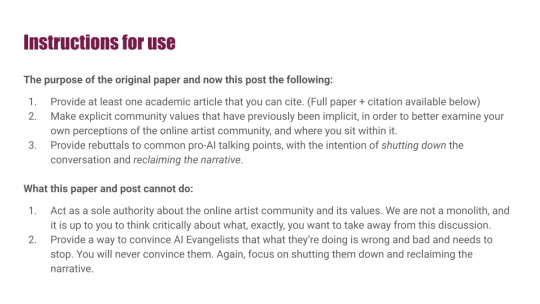
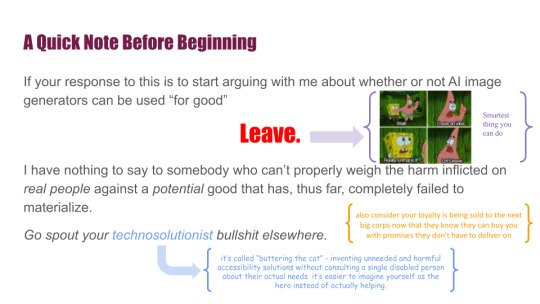
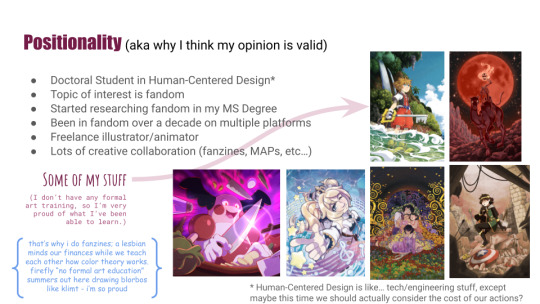
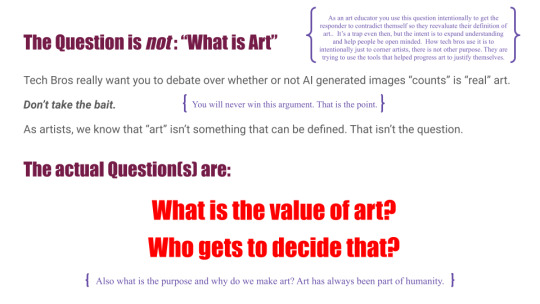
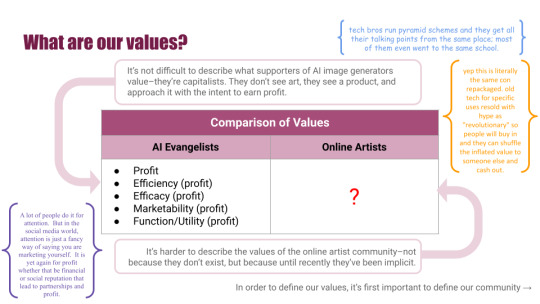
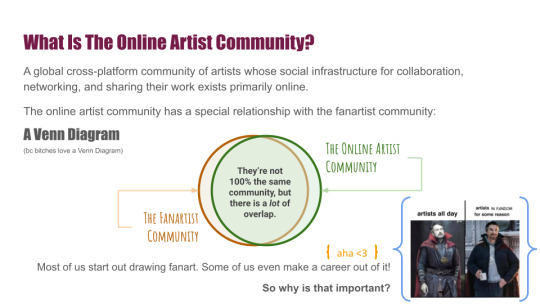
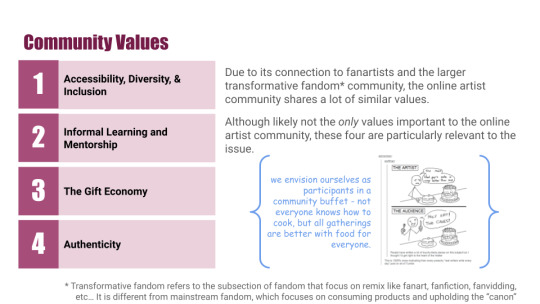
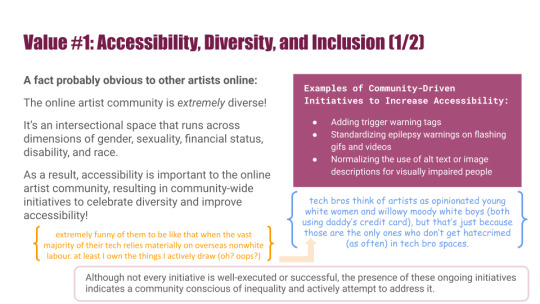
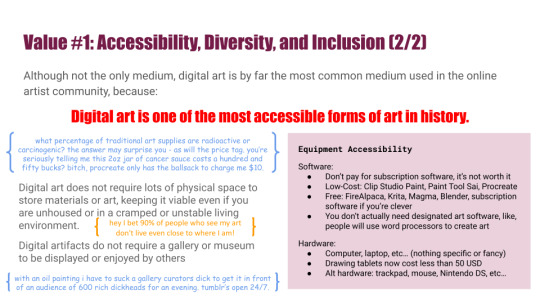
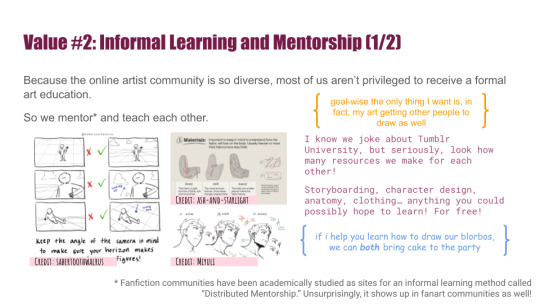
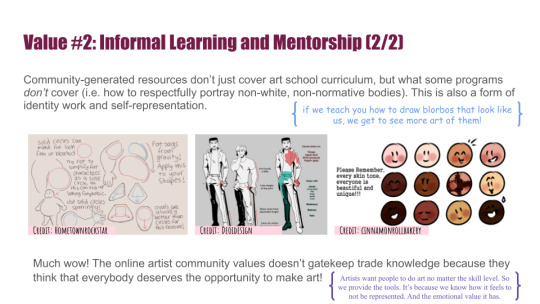
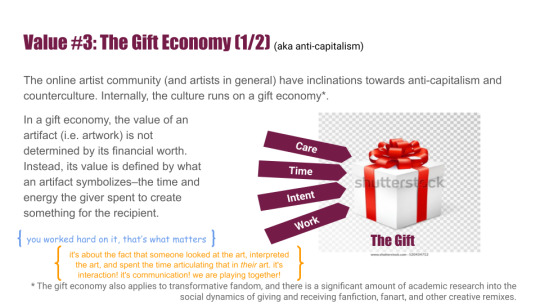
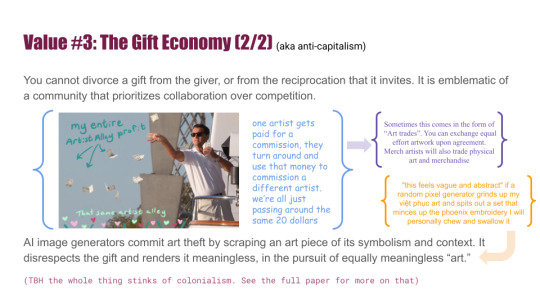
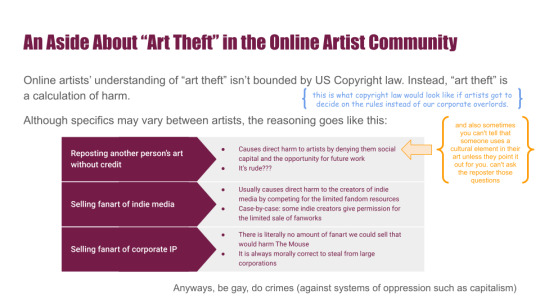
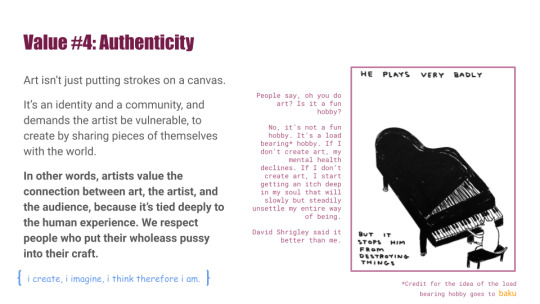
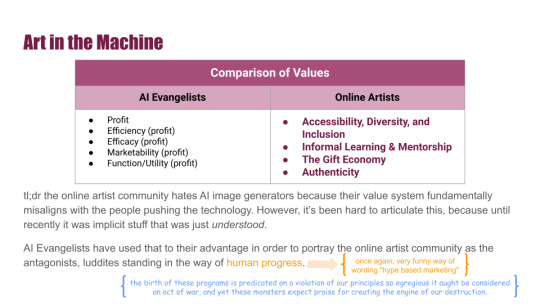
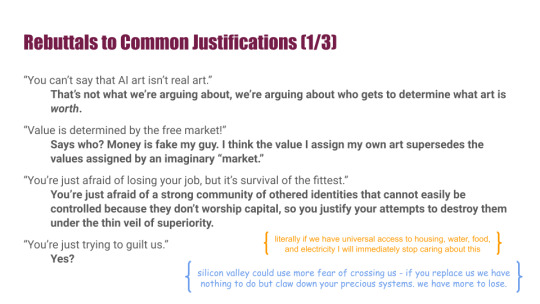
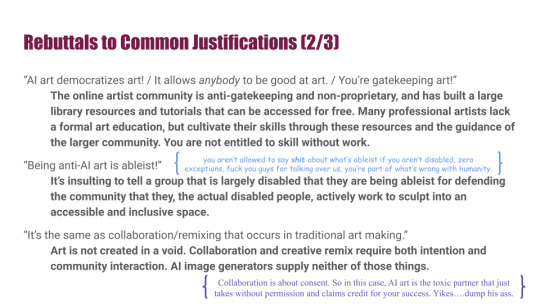
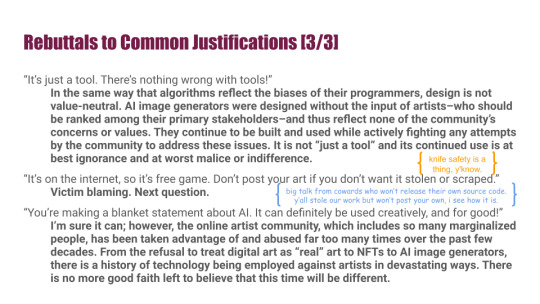
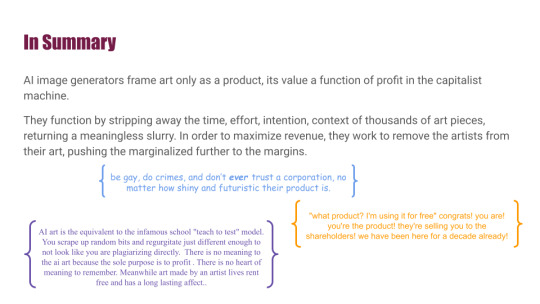
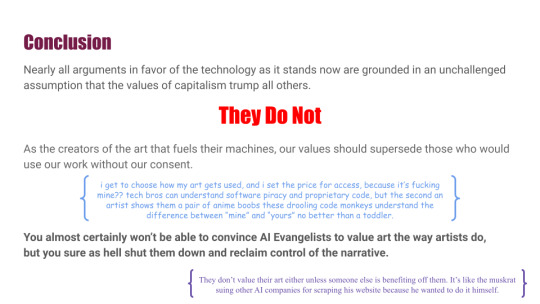
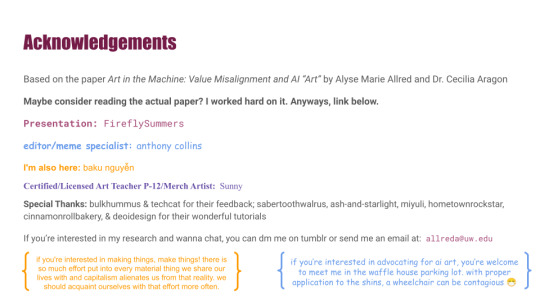
FireflySummers’ Guide to Arguing Against the Use of AI Image Generators
(AKA I hate AI image generators so fucking much that I published a whole ass academic article on it)
Read the Paper: Art in the Machine: Value Misalignment and AI "Art"
Citation: Allred, A.M., Aragon, C. (2023). Art in the Machine: Value Misalignment and AI “Art”. In: Luo, Y. (eds) Cooperative Design, Visualization, and Engineering. CDVE 2023. Lecture Notes in Computer Science, vol 14166. Springer, Cham. https://doi.org/10.1007/978-3-031-43815-8_4
The purpose of the original paper and now this post is the following:
Provide at least one academic article that you can cite. (Full paper + citation available below)
Make explicit community values that have previously been implicit, in order to better examine your own perceptions of the online artist community, and where you sit within it.
Provide rebuttals to common pro-AI talking points, with the intention of shutting down the conversation and reclaiming the narrative.
What this paper and post cannot do:
Act as a sole authority about the online artist community and its values. We are not a monolith, and it is up to you to think critically about what, exactly, you want to take away from this discussion.
Provide a way to convince AI Evangelists that what they’re doing is wrong and bad and needs to stop. You will never convince them. Again, focus on shutting them down and reclaiming the narrative.
Final Disclaimer: I'm a very fallible researcher who is still very much learning how to do academia. I cannot speak for the entirety of the online artist community or fanartist community. We all have different lived experiences. I have done my best to include diverse voices; however if you have concerns or critiques, I am open to hearing them.
If you show up to debate in favor of AI image generators, you will be automatically blocked.
Credits:
Editors, Meme Experts, and Annotators: @starbeans-bags, @b4kuch1n, @cecilioque.
Tutorial Examples: @sabertoothwalrus, @ash-and-starlight, @miyuliart, @hometownrockstar, @deoidesign, @cinnamonrollbakery
If you have read this far, thank you very much. I hope that you have found a constructive lens for approaching the war with AI image generators, as well as a new tool for shutting down debate and reclaiming the narrative.
#anti ai#fuck ai#fuck ai everything#fuck ai bros#anti ai art#ai is theft#ai is a plague#fandom#fandom research#fanart#my academics#that's a new tag for me#long post
3K notes
·
View notes
Text
I want Sentinel to suffer, and then to die in darkness.
I've been thinking about this line for a while now,
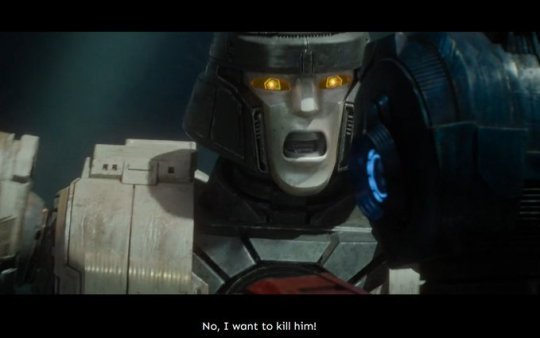
"No, I want to kill him! I want to put Sentinel in chains and march him through the mines so everyone can see him for the false Prime that he is! I want him to suffer, and then to die in darkness."
I find this sentence so revealing about the general Miner's state of mind.
Because, make no mistake, the movie is telling us in no uncertain terms, that the Miners are expected to die doing their job. And also, that they're punished if they don't accept this. Because the system views them as expendable, and tries its best to convince them as well.
The scene of the cave in shows this perfectly; protocol demands that a trapped miner be left behind, even if that means their death. Elita says it outright when Orion comunicates that Jazz is stuck: "Do not break protocol, EVACUATE" a.k.a, leave him. And maybe it's becase the only ones near Jazz at that moment were Dee and Orion, but the thing is, none of the other miners show any attempt to go in and help them. They remain still even when they see them near the exit while Elita does everything in her power to keep it open, to the point that it's D-16 the one that has to tackle her away from it when they're going out (also D-16 punching the walls of rock out of the way? Danm son).
The narrative is showing us that stopping to help is the exception, not the rule, and we can presume that if Jazz had been accompanied by different bots, he would have died. It took two of them to barely get him out of there. And man, you cannot tell me that Orion Pax never had to come to terms with the fact that if the one trapped in one of those tunnels was either him or Dee, one would have to choose between staying behind to save the other, possibly dying in the attemp, or leave their friend behind to save himself.
I want Sentinel to suffer, and then to die in darkness." - D-16.
We know that Orion could never live with this knowledge and do nothing about it. Because if he was in that scenario, he could not leave Dee, nor could he accept to be the cause of his end. So it gives additional meaning to his actions on the movie.
Because, sure, the movie presents Orion Pax as sort of bull headed and self centered (D-16 certainly calls those out as flaws), but his motives may not be so selfish as we're led to believe at first glance. He wants to find the Matrix of Leadership, not because he will be hailed as a hero if he does so, but because
"We will have to stop mining for energon" (We will stop having to die to find energon).
"We are meant for more than this" ( We are meant for more than to die in the mines).
"Don't you want to choose your own path, be able to do whatever we want?" (I don't want us to die)
It's always a "we". Because, after all, he doesn't want to see Dee die in the mines (or any of his friends, I dare say). This desperate desire to save D-16, and not just himself, is what puts the plot into motion. And he tries to save him by attempting to find the Matrix, but Orion also looks for ways to bring small joys to D-16 in the day to day, like bringing him the sticker, or participating in the race. Of course you could argue that he brought Dee to the race despite his protests because he wanted someone that he knew would watch out for him, I won't deny that, BUT, counterargument:
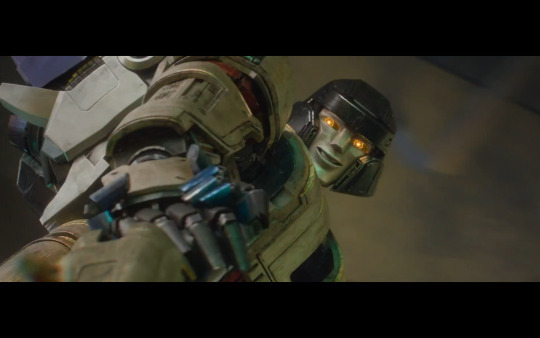
Look at his smile. This dude is having the time of his life participating in a race with his boyfriend and you can take that truth from my dead cold hands.
What I mean to say with all this, is that the movie tries to tell us in subtle ways that while both are trying to save the other, they're funtamentally different. D-16 is saving Orion from more inmediate problems, like hiding him from the guards, looking out for him in the mines and the race, etc. He has accepted the place they have in that society and he is resigned to it, because he thinks there's no other option. Meanwhile Orion is looking to save D-16 in a long term sort of way, by changing the Status Quo, because he refuses to accept that there are no other options.
They both cared so much for the other that they kept trying to keep the other safe in the only way they could fathom.
AND THEN THIS HAPPENS
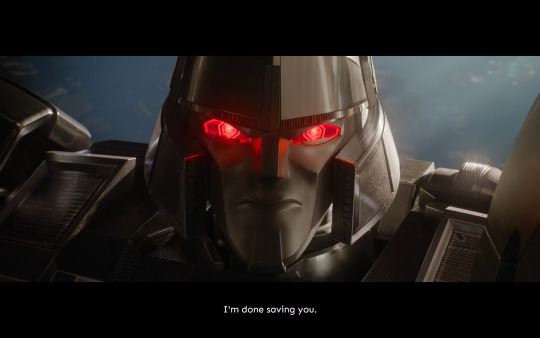
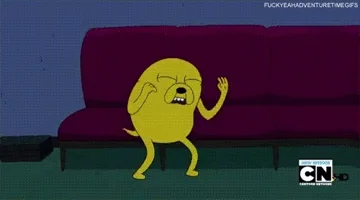
This fucking movie
#transformers#transformers one#tfone#tf one spoilers#megatron#d-16#orion pax#maccadam#transformers talk#tf one megatron#tf one optimus
351 notes
·
View notes
Text
lessons in protecting ur peace⋆.ೃ࿔*:・🛍️

after reading the book pyscho cybernetics something that rly stuck out to me was that literally EVERYTHING IS UR MIND. and duh, thats what i've primarily based my blog on…💬🎀
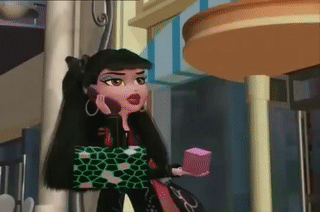

but i wanted to talk about the idea that everything that u experience is because of ur mind and that goes into how you interpret things as well. so lets talk about how u can protect ur peace through ur reactions.
CAN WE NOT? ;
first, lets remember that everyone experiences the world differently and reacts to things differently from each other. based on subconscious belief, self concept, upbringing, trauma etc. therefore everyones perception of things is shaped by their own unique brain.
for example lets imagine that theres a rly pretty girl and shes rly sweet. the people around her have an idea in their mind that pretty girls are stuck up and mean, so they look for reasons to categorize her and prove themselves right. they look for ways to make her fit into the narrative that they've fed themselves…💬🎀
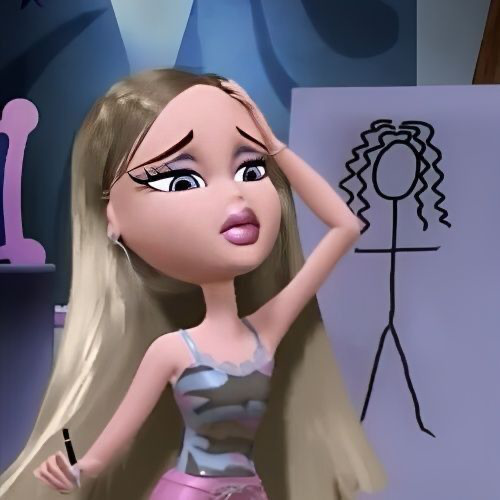
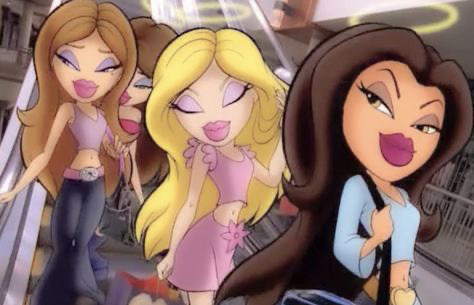
i give this example to show that peoples judgement of u is based more on them and their subconscious beliefs more then it is about you. period. someone else's problem with u isnt ur business. when u persist in a belief whether its consciously or subconsciously your reality will prove you right. your literally manifesting a belief that doesnt serve you so can we not?
PROTECT UR PEACE BY NOT TAKING THINGS PERSONALLY ;
taking things personally means, misinterpreting someone's thoughts/actions and believing them to be targeted toward us personally…💬🎀
this is particularly dangerous to our peace because when u take things personally you'll start to adopt what other people tell u about urself as fact. if someone calls u dumb then ur gonna believe them and think that something is wrong with you when that isnt the case.
if u know that ur actually rly intelligent and someone tells u that ur dumb, you won't care because you know that ur smart and you know that they're just projecting their beliefs unto you. you make the facts about you. not others.
YOU DECIDE THE FACTS ;
for a fun journal exercise i want you to write down the facts about yourself (u can also write down new traits that you'd like to manifest and make fact about urself) so open ur diary to a fresh page and write an about-me page. fill the page with positive facts about urself and who you are. these are the facts and if someone tells u otherwise, fact check em.
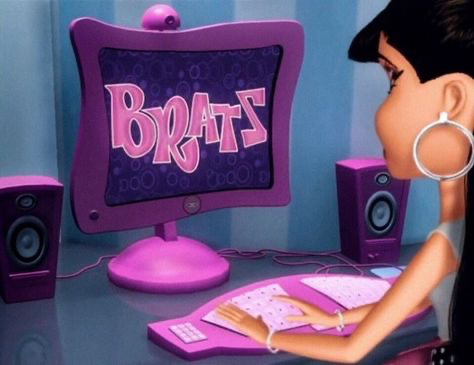
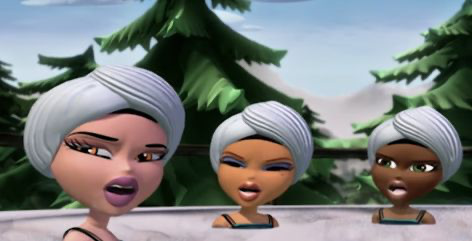
BE GENEROUS ;
people spew some crazy shit when they dont like you or are envious of you and the best way to respond is to first, not respond at all because they dont even deserve to get a reaction out of you. but if ur lowkey petty, add onto their accusations to make them look dumber.
like if they try to clock you about something and accuse u of something, make the accusation WORSE. ofc with nuance but have some fun with it sometimes.
people can't shame you for made up accusations if u dont care and if ur living in ur truth and therefore their agenda to try and bring u down to make themselves feel better is ultimately squashed. dont waste ur energy arguing with people and just keep that peace protected.
#advice#honeytonedhottie⭐️#it girl#becoming that girl#self concept#self care#that girl#self love#it girl energy#self improvement#self awareness#self growth#self development#dream girl tips#dream girl#dream life#hyper femininity#hyper feminine#girly#girl blog#girl blogging#bratz#bratz doll#self confidence#confidence tips#confidence#manifestation#manifesting tips#loa is easy#loa tumblr
522 notes
·
View notes